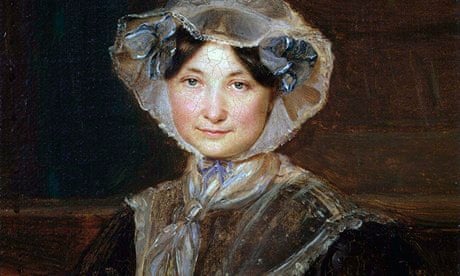
'Let it be as bad as it will, I shall get something for it' … Fanny Trollope.
My hero Fanny Trollope by Lucy Ellmann
5 October 2013
F
She was a feminist before the word existed. She wrote one of the first novels in English about American slavery – The Life and Adventures of Jonathan Jefferson Whitlaw (1836). In Domestic Manners of the Americans, she railed against the injustice meted out to Native Americans, too: "You will see them one hour lecturing their mob on the indefeasible rights of man, and the next driving from their homes the children of the soil, whom they have bound themselves to protect by the most solemn treaties." Trollope was one of those foreigners not taken in by the American dream: she came, she saw, and she returned to Europe (although for a time she was stuck in Cincinnati).
Trollope loved a spectacle, and was willing to make one of herself, too. For this, she was denounced as unfeminine and lacking in decorum. "Oh! ... that ladies would make puddings and mend stockings!" Thackeray moaned after reading one of her books. The novelist Elizabeth Lynn Linton was more indulgent, describing Trollope as "a vulgar, brisk and good-natured kind of well-bred hen wife, fond of a joke and not troubled by squeamishness."
The woman was undeniably brave, but what I like most about her is her curiosity. She talked to everybody and visited everything: mountains, cottages, waterfalls, schools, prisons, Viennese catacombs stuffed with corpses, and Congress, employing every means of travel then available (donkey, steamboat, raft, carriage). She also had an eye and ear for the telling detail. Americans, she observed, were always spitting and never thanked anybody, and alligators actually ate people.
Her take on autobiographical fiction? "I draw from life – but I always pulp my acquaintance before serving them up. You would never recognise a pig in a sausage."


No comments:
Post a Comment